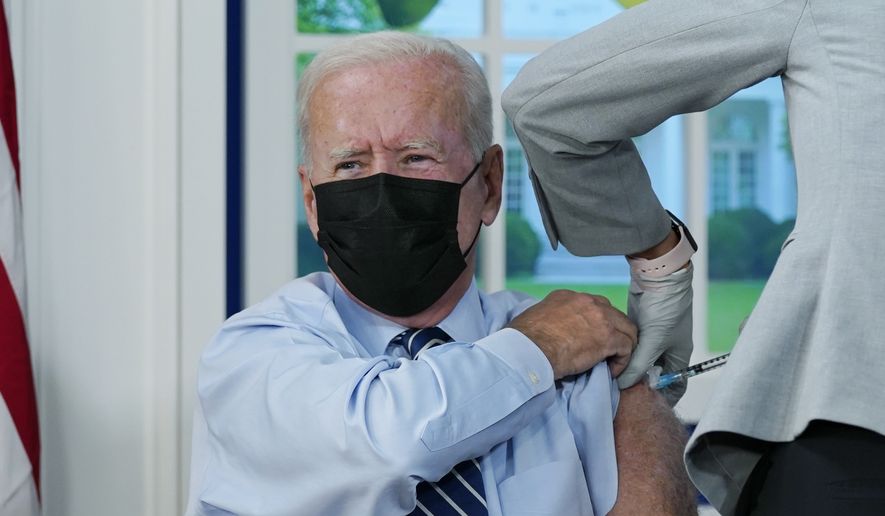President Biden received a booster shot of a COVID-19 vaccine in front of the cameras Monday, hoping to set a high-profile example after he prodded regulators to approve extra doses to stiff-arm the virus ahead of winter.
The president, donning a black mask, chatted casually with reporters as a nurse injected him with a third dose of the vaccine from Pfizer and BioNTech in his left arm.
The Food and Drug Administration approved boosters of the Pfizer vaccine last week for those over 65, people aged 18 to 64 at high medical risk from COVID-19 and those with jobs that expose them to the virus.
“I know it doesn’t look like it, but I am over 65, and that’s why I’m getting my booster shot today,” Mr. Biden, who is 78, said before rolling up his sleeve.
The president fielded questions from reporters during the process, saying he never felt side effects from the first and second shots that he received in the weeks prior to his inauguration.
Hours later, Senate Minority Leader Mitch McConnell said he received a Pfizer booster Monday.
The Kentucky Republican is a childhood polio survivor and staunch advocate of the vaccine.
“All throughout the pandemic, I’ve followed the best advice from experts and especially from my own healthcare providers. It was an easy decision to receive a booster,” he said. “Mountains of evidence tell us these shots are safe, effective, and dramatically shrink the odds of severe disease or death from COVID.”
Mr. Biden had pushed regulators to approve a third dose of the Pfizer and Moderna vaccines for all persons who received their second doses at least eight months ago. He’s worried about signs and data from other countries that immunity from the shots wanes over time.
The FDA said there was insufficient data on whether the general population needed a booster to avoid severe illness, prompting regulators to limit their final approval to subgroups who received a second Pfizer dose at least six months ago.
Regulators are expected to take up data from Moderna and the one-shot Johnson & Johnson versions in the coming weeks to see if additional doses are merited for those versions.
White House press secretary Jen Psaki said the administration realizes the layers of information can be confusing to the average American. She pointed to a handy chart behind her in the briefing room that lists who is eligible right now.
She also said the administration is looking at guidelines from the Centers for Disease Control and Prevention to determine which White House staffers might be considered at risk of infection due to their jobs.
“We’re still making a determination of how it would be applied,” she said.
Even as he pushes boosters, Mr. Biden is urging places with lagging vaccination rates to pick up the pace. Roughly 55% of the U.S. population is fully vaccinated, and just under a quarter of those eligible have refused to get at least one dose.
“The vast majority of Americans are doing the right thing. Over 77% of adults have gotten at least one shot. About 23% haven’t gotten any shots, and that distinct minority is causing an awful lot of damage for the rest of us,” Mr. Biden said.
Mr. Biden will travel to Chicago on Wednesday to tout his push for broader vaccine mandates through employers.
The World Health Organization and others say the U.S. and wealthy nations should focus on initial vaccinations in poor nations before doling out boosters, though Mr. Biden insists he can fully protect Americans and help the rest of the globe at the same time.
“We’re doing more than every other nation in the world combined,” he said.
• Tom Howell Jr. can be reached at thowell@washingtontimes.com.




Please read our comment policy before commenting.